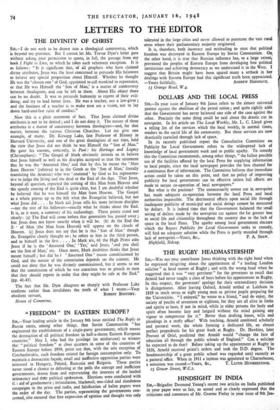LETTERS TO THE EDITOR
THE DIVINITY OF CHRIST
do not wish to be drawn into a theological controversy, which is beyond my province. But I cannot let Mr. Trevor Dyer's letter pass without asking your permission to quote, in full, the passage from my book I Fight to Live, to which he takes such vehement exception. It is as follows: " It is significant that, of all prophets who have claimed divine attributes, Jesus was the least concerned to persuade His followers to believe any special proposition about Himself. Whether he thought He was the 'chosen one' of God, appointed to call mankind to repentance, or that He was Himself the ' Son of Man,' is a matter of controversy between theologians, and can be left to them. About His object there can be no doubt. It was to persuade humanity to repent of their evil- doing, and try to lead better lives. He was a teacher, not a law-giver ; and the business of a teacher is to make men see a vision, not to lay down hard-and-fast rules of conduct."
Now this is a plain statement of fact. That Jesus claimed divine attributes is not to be denied ; and I do not deny it. The nature of these attributes is a matter of controversy between theologians—and, for that matter, between the various Christian Churches. Let me give one example, of many. Dr. Kirsopp Lake, late Professor of History in Harvard University, and one of the great theologians of our time, held the view that Jesus did not think he was Himself the " Son of Man." He gave his reasons, concisely, in Paul : his Heritage and Legacy (Christophers): " The Gospel of Mark obviously intends us to believe that Jesus himself as well as his disciples accepted as true the statement that he was the ' Anointed One,' and that by this he meant the ' Man from Heaven' (referred to in the Greek as the ' Son of Man,' literally translating the Aramaic) who was `anointed' by God as his representa- tive to judge the living and the dead at the End of the Age. That Jesus, beyond all question, expected the coming of this Man from Heaven and -the speedy coming of the End is quite dear, but I am doubtful whether be believed that he was himself the Man from Heaven. The Gospel as a whole proves up to the hilt what the Evangelist believed, but not what Jesus did . . . . In Mark xiii Jesus tells his more intimate disciples —not the rest of his followers—exactly what he thinks about the End. It is, as it were, a summary of his eschatology. Three points stand out clearly: (a) The End will come beforq that generation has passed away ; but Jesus does not know exactly when it will be. (b) At the End the S-- of Man (the Man from Heaven) will appear on the clouds of Heaven. (c) Jesus does not say that he is this ' Son of Man' though the Evangelist clearly thought so ; he refers to him in the third person, and to himself in the first . . . . In Mark xiv, 61 the High Priest asks Jesus if he is the Anointed One,' Yes,' said Jesus, and you shall see the Son of Man,' etc. Once more, Mark doubtless thinks that Jesus
meant himself ; but did he Anointed One' means commissioned by God, and the nature of the commission depends on the context. He could not deny that he was divinely commissioned, but it seems to me that the commission of which he was conscious was to preach to men that they should repent in order that they might be safe at the End." (pp. 41-43).
The fact that Mr. Dyer disagrees so sharply with Professor Lake confirms rather than invalidates the truth of what I wrote.—Your


































 Previous page
Previous page